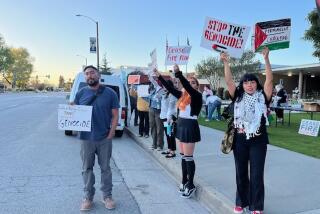The ‘delegitimization’ of Israel movement; reversals of 9th Circuit rulings; tabloids and the 1st Amendment
Taking a stand on Israel
Re “ ‘Delegitimization’ is just a distraction,” Opinion, July 17
M.J. Rosenberg writes: “Rather than seeking Israel’s elimination, the Palestinians … are seeking establishment of a state alongside Israel.”
Of the inconvenient truths Rosenberg avoids, none undermines his point more than the actual opinions of Palestinians, as revealed by a survey conducted by pollster Stanley Greenberg.
That poll found that only 34% of Palestinians accept the two-state solution; 66% believe Palestinians should start with a two-state solution and then move toward making it one Palestinian state; and 72% supported efforts to deny the thousands of years of Jewish connection to Jerusalem. Ominously, 73% agreed with Hamas charter, which calls for the indiscriminate killing of Jews.
If Rosenberg wants to maintain his credibility, he is going to have to do some serious tinkering with his narrative, or at least convince the Palestinians they need to keep their true beliefs to themselves.
David Feifel
La Jolla
Suggesting the Israeli-Palestinian conflict is simply over settlements is disingenuous. There is not yet a Palestinian state because Arab leaders refuse to publicly acknowledge that Israel has the right to exist as a Jewish, democratic state. This is delegitimization at its core. And instead of entering into direct peace talks with Israel, Palestinian Authority President Mahmoud Abbas has sought a unity government with Hamas.
Meanwhile, delegitimizing Israel is taking increasingly ominous forms. The “boycott, divestment and sanctions” movement seeks to attack Israel economically and deny scholars and artists exchanges with colleagues.
President Obama and Congress agree that Palestinian unilateralism is another attempt to question Israel’s legitimacy. A growing list of countries concur: A unilateral Palestinian declaration would set back efforts to achieve peace and security for Palestinians and Israelis.
Clifford Goldstein
Santa Monica
The writer is Los Angeles region president of the American Jewish Committee.
Occupation is just a distraction to keep the Arab Middle East from looking at the causes of the very real existential problems they face. Occupation was not an issue when Jordan occupied the West Bank and Egypt occupied the Gaza Strip. It only became an issue after the Six-Day War in 1967.
The real issue is the very existence of Israel. The Palestine Liberation Organization was founded in 1964, three years before Israel occupied the West Bank and the Gaza Strip, and its goal was wiping out Israel. In spite of what Rosenberg claims about the PLO recognizing Israel, it never officially changed its charter.
Perhaps when Fatah, Hamas and Hezbollah all decide that a Jewish state has the right to exist in peace, peace can be achieved and the occupation can end.
Emanuel R. Baker
Los Angeles
The 9th Circuit’s reversal record
Re “9th Circuit reversed again,” July 18
It comes as no surprise that the U.S. 9th Circuit Court of Appeals suffered another year of bad legal decisions. It’s to the point now that whenever it makes a contentious ruling, we can pretty much ignore it. The court’s arrogance is captured by Judge Stephen Reinhardt, who tries to justify his dismal record of reversals as a compliment.
UC Irvine law school Dean Erwin Chemerinsky clears it all up by saying reversal rates don’t mean the Supreme Court is right, just that it has the last word. Following that lawyerly logic, I guess there is no right or wrong, just who has the last word.
John Corina
Commerce
It was staggeringly misleading to open the story about the 9th Circuit by saying “the Supreme Court overturned the majority” of its decisions.
The 9th Circuit decides about 5,000 cases annually, so the 26 cases the Supreme Court chose to review represent about one-half of 1% of its rulings, and the 19 reversals represent about one-third of 1%.
I suppose “Supreme Court leaves 99.6% of 9th Circuit decisions untouched” does not make for a catchy headline, but that number should have been mentioned in the story.
Howard Posner
Los Angeles
Waging war on the tabloids
Re “Tabloids don’t deserve the 1st,” Opinion, July 19
Jeffrey Scott Shapiro’s contention that “the judicial system is too quick to bow before the 1st Amendment” fails to address any bright line between tabloids and other forms of journalism.
Not every tabloid reporter hacks the voice mail of murdered teenagers, and not all New York Times reporters adhere to the highest principles of their calling.
People who hold sacrosanct the free flow of ideas should view with alarm governments that, in the name of upholding a pure and perfect view of journalism, threaten to enforce tighter controls over that press. This is happening in Britain now and will happen soon in the U.S. if Rep. Peter T. King (R-N.Y.) holds hearings.
I am no fan of Fox News or any Rupert Murdoch holding, but once we start shutting them down, who knows where we will stop.
Joan Walston
Santa Monica
Which part of “Congress shall make no law” didn’t they teach Shapiro in law school? His argument is premised on the view that his job as a criminal and media attorney would be easier if we could curtail bothersome constitutional protections.
Joseph Di Monda
Manhattan Beach
Two Californias
Re “Attempts to divide state multiplied,” July 17
The 1859 attempt by Assemblyman Andres Pico to split California was not the first. California moved to be admitted to the Union as a free state in 1849, a request that was greeted by fierce opposition from Southern slave states.
When California sought statehood, there was no matching slave state to admit at the same time. One of the solutions proposed was to split California into north and south, the latter as a slave state. This was rejected by California, and in the Compromise of 1850, California was admitted as a free state, although with one pro-slavery senator and one against.
Jonathan Hubbell
Laguna Niguel
Real learning
Re “When to move students on?,” July 18
The Los Angeles Unified School District’s renewed effort to end social promotion is a crucial element in easing the out-of-control financial crisis facing education. With a significant number of college freshmen needing remedial English before they can move on, the district’s action takes on increased significance.
If non-readers were not allowed to advance beyond third grade, the social promotion problems in the fifth, ninth and 12th grades would ease significantly. If necessary, to avoid the stigma and parental wrath of holding children back, the district could develop a reading program irrespective of grade level that encompassed different ages. Passing would be a requirement of moving on.
Allowing non-readers to advance grades only kicks the problem down the road, a common trend with too many of our dilemmas.
Glenn Egelko
Ventura
Prison woes
Re “Prisoners’ hunger strike in 3rd week,” July 19
It has been said that one test of a nation is how it treats prisoners, and yet most in California are unaware of the deplorable conditions in our prisons — conditions that include severe overcrowding and extremely long periods of solitary confinement.
Apparently, conditions are so bad that at least 400 inmates are on a hunger strike.
Even worse, our own prison officials have refused media access to these prisons, citing “security and safety issues.”
Does this sound like the behavior of the world leader in human rights or that of a troubled Third World country?
Todd Mason
Los Angeles
Where’s my bag?
Re “No bag-check fee on lost bags,” Business, July 18
Airlines are not required to refund baggage check-in fees for “delayed” bags but must for “lost” bags.
I suggest that the
Department of Transportation adopt a policy that gives a time limit for delayed bags, after which the fees must be refunded if the bag is delayed longer than seven days. At 14 days, if the bag is not returned to the passenger, an airline should refund double the fee.
It is unconscionable for airlines to exploit the current loophole of claiming a lost bag as “delayed.”
Iku Kiriyama
Torrance
More to Read
A cure for the common opinion
Get thought-provoking perspectives with our weekly newsletter.
You may occasionally receive promotional content from the Los Angeles Times.






